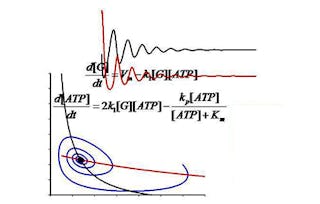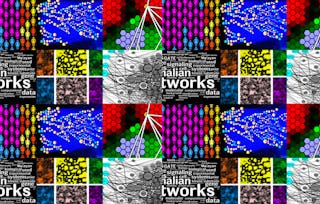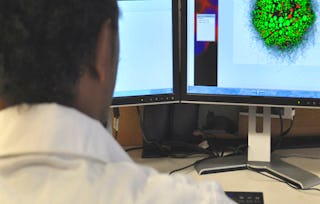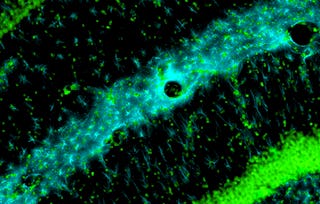This course will introduce the student to contemporary Systems Biology focused on mammalian cells, their constituents and their functions. Biology is moving from molecular to modular. As our knowledge of our genome and gene expression deepens and we develop lists of molecules (proteins, lipids, ions) involved in cellular processes, we need to understand how these molecules interact with each other to form modules that act as discrete functional systems. These systems underlie core subcellular processes such as signal transduction, transcription, motility and electrical excitability. In turn these processes come together to exhibit cellular behaviors such as secretion, proliferation and action potentials. What are the properties of such subcellular and cellular systems? What are the mechanisms by which emergent behaviors of systems arise? What types of experiments inform systems-level thinking? Why do we need computation and simulations to understand these systems?

Introduction to Systems Biology

Introduction to Systems Biology
This course is part of Systems Biology and Biotechnology Specialization

Instructor: Ravi Iyengar, PhD
51,962 already enrolled
Included with
577 reviews
Skills you'll gain
Details to know

Add to your LinkedIn profile
10 assignments
See how employees at top companies are mastering in-demand skills

Build your subject-matter expertise
- Learn new concepts from industry experts
- Gain a foundational understanding of a subject or tool
- Develop job-relevant skills with hands-on projects
- Earn a shareable career certificate

There are 10 modules in this course
Module description goes here.
What's included
5 videos3 readings1 assignment
Module description goes here.
What's included
4 videos3 readings1 assignment
Module description goes here.
What's included
4 videos3 readings1 assignment
Module description goes here.
What's included
4 videos4 readings1 assignment
Module description goes here.
What's included
1 assignment
Module description goes here.
What's included
4 videos3 readings1 assignment
Module description goes here.
What's included
4 videos4 readings1 assignment
Module description goes here.
What's included
4 videos4 readings1 assignment
Module description goes here.
What's included
5 videos4 readings1 assignment
Module description goes here.
What's included
1 assignment
Earn a career certificate
Add this credential to your LinkedIn profile, resume, or CV. Share it on social media and in your performance review.
Instructor

Offered by
Explore more from Basic Science
 Status: Free Trial
Status: Free TrialIcahn School of Medicine at Mount Sinai
 Status: Free Trial
Status: Free TrialIcahn School of Medicine at Mount Sinai
 Status: Free Trial
Status: Free TrialIcahn School of Medicine at Mount Sinai
 Status: Free Trial
Status: Free TrialIcahn School of Medicine at Mount Sinai
Why people choose Coursera for their career

Felipe M.

Jennifer J.

Larry W.

Chaitanya A.
Learner reviews
- 5 stars
56.67%
- 4 stars
25.82%
- 3 stars
8.49%
- 2 stars
4.67%
- 1 star
4.33%
Showing 3 of 577
Reviewed on Sep 19, 2023
Module 1: Introduction was a challenge. The lecture verbal dialogue needs to be edited in the corresponding "printed" version.
Reviewed on Jun 11, 2020
The content of this course is quiet good, but is little bit hard to digest. Overall, I gained a lot of things from this course.
Reviewed on Apr 10, 2022
I enjoyed the topics that were covered in the course. I removed one star because the quizes required deeper knowledge than what was covered during the lectures.

Open new doors with Coursera Plus
Unlimited access to 10,000+ world-class courses, hands-on projects, and job-ready certificate programs - all included in your subscription
Advance your career with an online degree
Earn a degree from world-class universities - 100% online
Join over 3,400 global companies that choose Coursera for Business
Upskill your employees to excel in the digital economy
Frequently asked questions
To access the course materials, assignments and to earn a Certificate, you will need to purchase the Certificate experience when you enroll in a course. You can try a Free Trial instead, or apply for Financial Aid. The course may offer 'Full Course, No Certificate' instead. This option lets you see all course materials, submit required assessments, and get a final grade. This also means that you will not be able to purchase a Certificate experience.
When you enroll in the course, you get access to all of the courses in the Specialization, and you earn a certificate when you complete the work. Your electronic Certificate will be added to your Accomplishments page - from there, you can print your Certificate or add it to your LinkedIn profile.
Yes. In select learning programs, you can apply for financial aid or a scholarship if you can’t afford the enrollment fee. If fin aid or scholarship is available for your learning program selection, you’ll find a link to apply on the description page.
More questions
Financial aid available,

